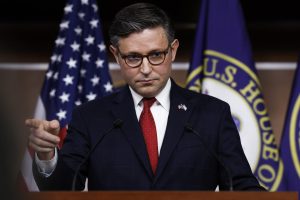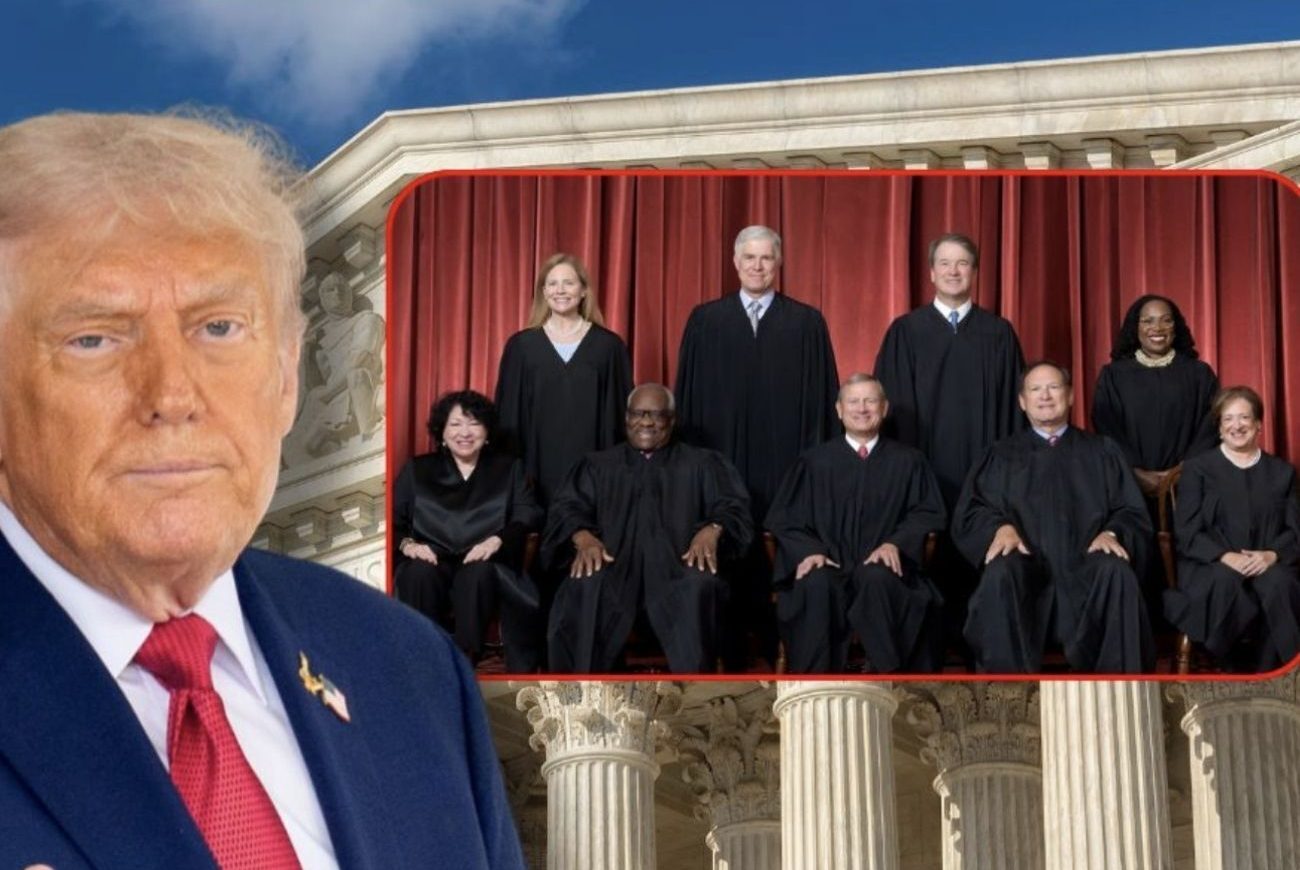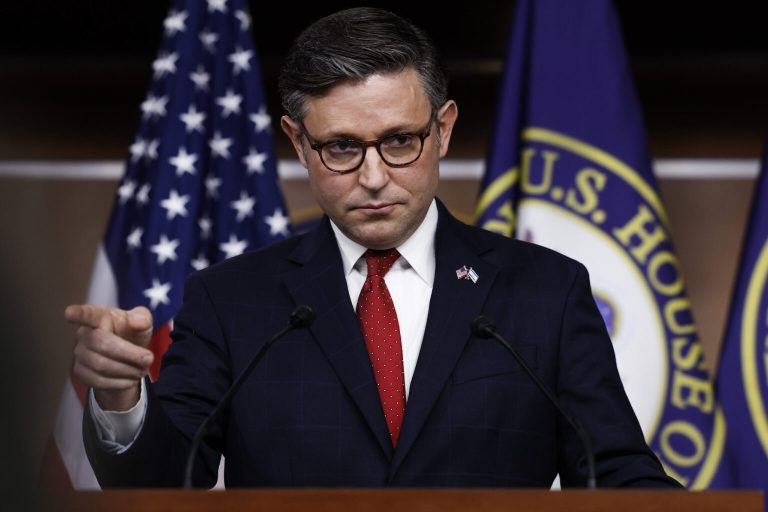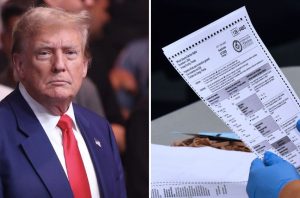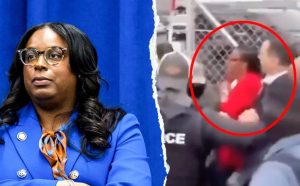High Court Sides 8–1 With Administration Over Temporary Protected Status Policy
In a sweeping legal victory for the Trump administration, the U.S. Supreme Court on Monday upheld the administration’s authority to end Temporary Protected Status (TPS) protections for certain groups of migrants — a ruling that clears the way for major shifts in U.S. immigration enforcement policy.
The 8–1 decision marked one of the most decisive rulings yet in favor of President Donald Trump’s immigration agenda during his second term, with even several of the court’s liberal-leaning justices joining the majority opinion. Only Justice Ketanji Brown Jackson dissented.
The court’s opinion reverses a lower-court injunction that had blocked the Department of Homeland Security (DHS) from terminating TPS protections granted under the prior administration.
What the Decision Means
The ruling allows the administration to move forward with plans to end Biden-era TPS protections for an estimated 300,000 Venezuelan nationals living in the United States, restoring the executive branch’s full discretion over the temporary humanitarian program.
The decision also affirms that questions about TPS designations and terminations fall squarely within the executive branch’s authority and are “not subject to second-guessing” by the judiciary when based on national interest or foreign policy considerations.
Justice Neil Gorsuch, writing for the majority, said the lower courts had “substituted their own judgment for that of the executive in matters where Congress has vested exclusive discretion in the president and the Secretary of Homeland Security.”
“The judiciary may not intrude upon the foreign-policy-laden judgments committed by statute to the executive branch,” the opinion stated. “The Constitution does not permit district courts to micromanage immigration policy.”
The Legal Challenge and Lower Court Rulings
The case stemmed from a lawsuit filed by advocacy groups and several TPS recipients after DHS Secretary Kristi Noem announced in February that the department would terminate Venezuela’s TPS designation, effective April 2025.
A district court in California, led by Judge Edward Chen, halted the order in March, calling the administration’s reasoning “arbitrary” and “tinged with discriminatory animus.” Judge Chen suggested that the DHS memorandum’s language — describing certain criminal elements within migrant populations — was “baseless and smacks of racism.”
That injunction froze the administration’s plan and left hundreds of thousands of Venezuelan migrants in limbo.
The Trump administration appealed, arguing that the lower court had overstepped its bounds by interfering in a domain explicitly delegated to the executive branch.
Solicitor General Sauer’s Argument Before the Court
When U.S. Solicitor General John Sauer presented the case before the Supreme Court earlier this month, he emphasized that decisions regarding TPS are inherently policy-based and discretionary, not judicially enforceable unless Congress explicitly limits that discretion.
“The district court’s reasoning is untenable,” Sauer told the justices. “The program implicates particularly sensitive and foreign-policy-laden judgments of the Executive Branch regarding immigration policy.”
Sauer’s argument — that the lower court had intruded into the executive’s constitutional prerogative — ultimately persuaded eight of the nine justices.
Inside DHS’s Decision
The Trump administration’s move to revoke TPS protections for Venezuelan nationals followed a detailed internal review conducted by the Department of Homeland Security, which concluded that the country no longer met the statutory conditions required for the designation.
A February 2025 memo issued by DHS Secretary Kristi Noem explained the rationale:
“After reviewing current country conditions and consulting with appropriate U.S. Government agencies, the Secretary of Homeland Security has determined that Venezuela no longer meets the conditions for the 2023 designation,” the memo said.
“Specifically, it has been determined that it is contrary to the national interest to permit the covered Venezuelan nationals to remain temporarily in the United States. Therefore, the 2023 TPS designation of Venezuela is being terminated.”
The memo cited improvements in Venezuela’s security environment and changes in diplomatic relations that made continued protection unnecessary.
A Brief History of Venezuela’s TPS Designation
The Temporary Protected Status program, established under the Immigration and Nationality Act of 1990, allows the Secretary of Homeland Security to grant temporary legal status to nationals of countries experiencing armed conflict, environmental disasters, or extraordinary conditions preventing safe return.
Under the Biden administration, then-Secretary Alejandro Mayorkas first designated Venezuela for TPS in March 2021, citing political turmoil and humanitarian crises.
That protection was extended twice — in September 2022 and October 2023 — creating overlapping designations for different Venezuelan migrant groups.
In January 2025, Mayorkas issued yet another extension through October 2026, consolidating both designations.
Just weeks later, Secretary Noem, newly appointed under President Trump, rescinded Mayorkas’s extension, citing statutory grounds and national interest.
Supreme Court Affirms Executive Discretion
The Supreme Court’s decision affirms that DHS’s discretion to terminate TPS designations is virtually unreviewable unless explicitly limited by statute.
Justice Samuel Alito, in a concurring opinion, wrote that “Congress entrusted the Secretary, not the courts, with the responsibility to decide when and whether temporary protection remains justified.”
He added, “While humanitarian considerations may inform policy, they do not grant federal courts the authority to second-guess executive judgments in this sphere.”
Justice Jackson’s Lone Dissent
Justice Ketanji Brown Jackson, the court’s sole dissenter, argued that the administration’s decision lacked sufficient procedural safeguards and failed to account for the humanitarian consequences of mass deportations.
Jackson wrote that terminating TPS for Venezuelan nationals without a full evidentiary review “invites arbitrary decision-making” and “risks eroding America’s moral credibility on the world stage.”
However, her dissent drew little support from her colleagues, including Justice Sonia Sotomayor, who joined the majority despite expressing reservations during oral arguments.
Reaction From the White House and DHS
The Trump administration hailed the ruling as a defining legal victory.
“The Supreme Court has reaffirmed what we have said from day one — that immigration policy belongs to the president and not to activist judges,” a White House spokesperson said in a statement.
DHS released a statement saying it “will comply with all legal requirements and carry out the policy consistent with the Court’s decision.”
Officials indicated that DHS will begin reviewing individual cases within the TPS population and initiating removal proceedings “in accordance with law and humanitarian discretion.”
Critics Warn of Fallout
Immigration advocacy organizations denounced the ruling, calling it a “humanitarian setback.”
The National Immigration Law Center said the decision “puts hundreds of thousands of Venezuelans at risk of deportation to a country still struggling with instability.”
Democratic lawmakers also criticized the outcome, with several urging Congress to pass legislation codifying TPS protections for certain groups.
However, administration officials countered that the law was never meant to provide indefinite residency.
“TPS means temporary,” one DHS official said. “It was never designed to become a permanent pathway to citizenship.”
A Broader Shift in Immigration Policy
The Supreme Court ruling marks a pivotal moment in the administration’s broader effort to restore enforcement discretion and tighten humanitarian programs that ballooned during the previous administration.
Over the past year, DHS has expanded detention capacity, increased deportation flights, and reintroduced the “Remain in Mexico” policy for asylum seekers pending review.
Analysts say the ruling will embolden the administration to move faster on immigration enforcement — and could deter new waves of unlawful migration from Central and South America.
Political Implications
The decision also carries major political weight. With immigration remaining a top issue for voters, the ruling reinforces the administration’s argument that it is delivering on its promise to restore law and order at the border.
Polls show that a majority of Americans support requiring stronger immigration enforcement and tighter controls on temporary protections.
A recent Gallup survey found that 64% of respondents favor reducing the number of people granted temporary or humanitarian protections — the highest level recorded since 2006.

James Jenkins is a celebrated Pulitzer Prize-winning author whose work has reshaped the way readers think about social justice and human rights in America. Raised in Atlanta, Georgia, James grew up in a community that instilled in him both resilience and a strong sense of responsibility toward others. After studying political science and creative writing at Howard University, he worked as a journalist covering civil rights issues before dedicating himself fully to fiction. His novels are known for their sharp, empathetic portraits of marginalized communities and for weaving personal stories with broader political realities. Jenkins’s breakout novel, Shadows of Freedom, won national acclaim for its unflinching look at systemic inequality, while his more recent works explore themes of identity, resilience, and the fight for dignity in the face of oppression. Beyond his novels, James is an active public speaker, lecturing at universities and participating in nonprofit initiatives that support literacy and community empowerment. He believes that storytelling is a way to preserve history and inspire change. When not writing, James enjoys jazz music, mentoring young writers, and traveling with his family to explore cultures and stories around the world.
